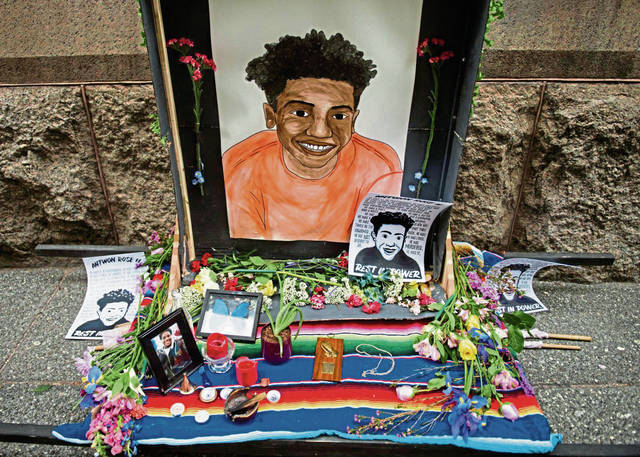The last two years have been a slow, painful slog for Michelle Kenney.
The 51-year-old Rankin woman lost her son two years ago Friday after he was shot and killed by an East Pittsburgh police officer.
Antwon Rose II, 17, a black youth who had begun his senior year as an honor student at Woodland Hills High, died June 19, 2018, as he ran from a Chevy Cruze that Officer Michael Rosfeld stopped because it matched the description of a car involved in a drive-by shooting minutes earlier.
Last year, Kenney watched as a jury in Allegheny County acquitted Rosfeld of homicide. East Pittsburgh later settled a federal civil rights lawsuit with her family for $2 million.
The borough disbanded its police department, and Rosfeld, who previously had been fired from the University of Pittsburgh campus police department, no longer works in law enforcement.
Along the way, Kenney worked quietly to change the culture of policing she believes led to her son’s death.
This month, she broke down when state Attorney General Josh Shapiro called to tell her Pennsylvania lawmakers were on the verge of creating a database that would identify police officers with a history of excessive use-of-force complaints and that there was a move to name it “The Rose Registry” in memory of her son.
“When I got that call from the attorney general, I think I cried, I smiled, I laughed. I was trying to get the attention of my daughter as she was coming in the door. That has been one of the first moments during this that I actually believed we were finally a force for change,” Kenney said.
Lawmakers say Shapiro, who brought police agencies together with the legislative black caucus last fall to discuss reform measures, has been instrumental in building support among police for the creation of a database and other changes aimed at reforms in police training.
Shapiro said Kenney has played an important role in the effort.
“I think she has been an incredibly constructive force for change,” he said. “She is very thoughtful and reasonable and measured.”
Had the reforms she is seeking been in place two years ago, Kenney said her son might be alive today.
Although police-involved deaths and allegations of racism in policing have been under growing scrutiny for years, there has been little change in the pace of police-involved deaths.
Philip Stinson, a former police officer and lawyer who is a criminology professor at Bowling Green University, studies police violence and tracks police-involved shootings across the U.S. He said the numbers remain fairly static, with about 1,000 people dying in police shootings every year.
The database proposal, an effort to eliminate police officers with a history of excessive-force complaints from jumping from one community to another, had been bottled up in committee in the Pennsylvania Legislature for nearly two years until this month.
Advocates for change say a video clip of the May 25 death of George Floyd, a black man who died at the hands of a white Minneapolis police officer, proved a tipping point in the conversation about race and policing.
Floyd’s death at the hands of Officer Derek Chauvin, who knelt on Floyd’s neck for 8 minutes and 46 seconds, triggered a series of protests in communities small and large across the country and world.
As protests raged in the streets, debate in Harrisburg and Washington turned to the kind of reforms Kenney had been advocating.
She was among the parents of eight young black men who died in police custody who were invited to Washington this week to meet with members of Congress weighing new laws addressing policing.
Her group was invited to a meeting with President Trump; Kenney said she declined. She later disputed the president’s assertion, as he announced Tuesday an executive order on police reforms, that he had met with Rose’s family.
“I was just standing in my truth,” Kenney said.
She said she refused to be a prop for Trump’s sudden change of heart about the need for police reform. Kenney said she was touched that Trump mentioned Antwon’s name as someone who might have been alive had hiring reforms been in place.
“But this was not a photo-op for me,” Kenney said.
She came away with a high opinion of Sen. Tim Scott of South Carolina, the only black Republican in the U.S. Senate. He met with the families to discuss their concerns about police reform. He has been crafting a bill that will include new restrictions on police choke-holds and the greater use of police body cameras, among other issues.
“I think Sen. Scott totally understands what is lacking,” Kenney said.
Stinson said he’s encouraged by the debate but said real change will require changing the culture of policing in America.
“They need to deal with institutional racism in policing. They need to deal with the fact that many police officers fear black men and black boys, and many police officers don’t live in the communities they police,” he said.
Kenney agreed much work remains.
“As much as I would like it to happen overnight, I am also a realist. I understand this is going to be a process, and I always understood it would be a fight,” she said. “I am hoping now that Republicans (in Harrisburg) will take the lead of the president and say, ‘He took the first step, and now it’s on us.’ ”











